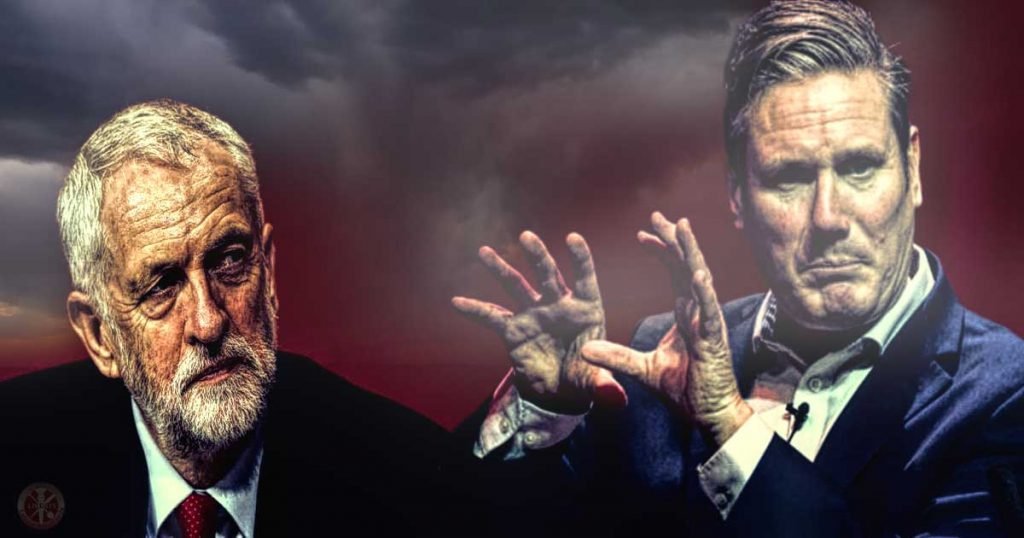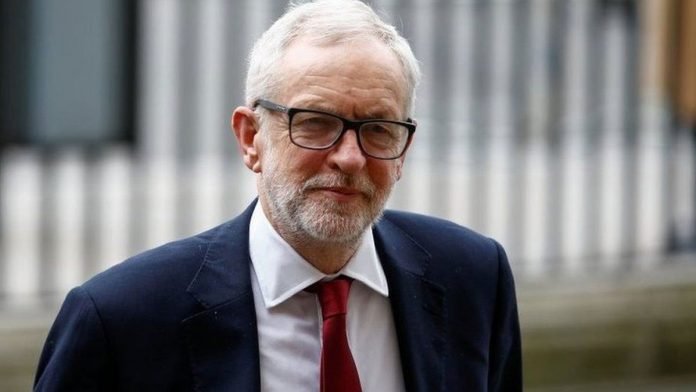Gaza’s Cry for Peace: Corbyn Channels Gordon Wilson’s Remarkable Journey
Jeremy Corbyn recently invoked Gordon Wilson’s remarkable response to personal tragedy in Northern Ireland as inspiration for ending today’s violence between Israel and Palestine.
Writing for the Tribune the article starts: “Daddy, I love you very much”. Those were the last words of Gordon Wilson’s daughter, Marie, on the 8 of November 1987. Both Gordon and Marie had been attending a Remembrance Day parade in the Northern Irish town of Enniskillen when a bomb exploded, planted by the Provisional IRA just behind the cenotaph. Buried under the rubble, Gordon held his daughter’s hand as she drifted out of consciousness. By the time they were rescued, it was too late. Marie was killed. She was just one of the 3,500 lives that were lost over the course of the Troubles.
IRA attacks in Northern Ireland frequently resulted in retaliation by loyalists. On this occasion, however, there was no immediate reprisal. ‘I bear no ill will. I bear no grudge’, Gordon said only hours after her death; ‘That will not bring her back.’ In the depths of darkness, Gordon somehow found the courage to plead with the loyalists not to retaliate. At least temporarily, they listened.
Gordon spent the remainder of his life trying to break the endless cycle of violence for good. ‘I went in innocence to search for what my heart told me might be a way forward…I got nothing’, Gordon reflected. However, seven years after Marie’s death, his seemingly impossible dream of peace began to come true.
Two months after a ceasefire in August 1994, Gordon sat down next to representatives from Sinn Fein in a forum for peace and reconciliation. It wasn’t until 1998 that the Good Friday Agreement was finally passed, when both sides recognised the shared yet often troubled and divisive history of the island of Ireland. Gordon’s contribution lies in the lasting lesson of his remarkable humanity: that there is always hope for peace.

Drawing a poignant parallel to the present, the article emphasises the urgent need for political leaders to heed this lesson. Corbyn highlights the ongoing humanitarian crisis in Gaza, where lives are being lost, basic survival means are dwindling, and medical professionals struggle under dire conditions. The article challenges political leaders to shift their focus from perpetuating divisive conversations to actively seeking an end to the current horror. In doing so, it calls for a collective commitment to fostering peace, echoing Gordon Wilson’s enduring message of hope amid adversity.
It is in the face of unimaginable grief, that Gordon Wilson’s resounding plea for peace echoes: ‘I bear no ill will. I bear no grudge.’ His legacy teaches us an unassailable truth – no war was ever halted by more violence, and no terrorist ever sat at the table without mutual understanding and a modicum of professional respect needed to open talks. As we confront the horrors of our time, let us remember: true dialogue begins with empathy, not enmity, and enduring peace is forged through the courageous pursuit of shared humanity.
Breaking the Cycle
However, as always the message is lost. Instead, following the media frenzy that erupted this week when Jeremy Corbyn declined to explicitly label Hamas a “terrorist group” during a TV interview, opting instead to use diplomatic language in urging an end to violence. The result was a fierce media backlash, suggesting he was soft on terrorism.
Despite Corbyn unequivocally condemning Hamas as a terrorist group in writing, the media onslaught continued unabated. Even after he penned the Tribune article stating plainly: “If we understand terrorism to describe the indiscriminate killing of civilians, in breach of international law, then of course Hamas is a terrorist group,” the condemnation kept coming.
But these nuances elicited no reassessment, nor any retraction of rash statements. Instead, the focus now shifts to the fact that Corbyn reiterated that Israel’s bombing of hospitals and killing of over 11,000 Palestinians also constitutes terrorism.
Earlier in the week, Labour leader, Keir Starmer had declared Corbyn’s “days as a Labour MP are over” based on the initial TalkTV’s Piers Morgan Uncensored programme interview.
Starmer was asked on the News Agents podcast whether the interview would preclude Corbyn from standing for Labour again, said: “He won’t stand as a Labour MP at the next election or any election. His days as a Labour MP are over. We have a changed party.”
Corbyn had already been blocked from running again. He had the Labour whip in parliament removed in October 2020 at Starmer’s whim after being reinstated by the NEC from a short suspension. He now sits as an independent MP but remains a Labour member. He has indicated he could run against the party in the next general election in his seat, where he has significant support.

Starmer – who served in Corbyn’s shadow cabinet – said he was “taken aback and shocked” by his predecessor’s refusal to describe Hamas as a terrorist organisation saying:
“It reaffirmed in me why it is so important to me and to this changed Labour party that Jeremy Corbyn does not sit as a Labour MP and will not be a candidate at the next election for the Labour party,” he said. “That is how far we have changed as the Labour party.” In actual fact, it reaffirmed to many how far the Labour Party has gone in leaving the people on this issue.
But once again we see Corbyn faces selective outrage and bad faith attacks. Despite the clarity of his positions, the media onslaught persists without respite, overshadowing the profound message he conveys in the Tribune magazine.
Rather than acknowledging Corbyn’s explicit denunciation of Hamas, his detractors opt to shift the goalposts and manipulate standards, refusing to own up to their own missteps. Even when he categorically labels them as terrorists in print, some remain obstinate, demonstrating a vested interest in perpetuating attacks rather than fostering genuine understanding. The substance of Corbyn’s powerful message in the Tribune magazine becomes a casualty of this relentless and, at times, disingenuous scrutiny.
Corbyn’s approach reflects a deeper analysis of power dynamics. Hamas’ unacceptable tactics arise from desperation under occupation. Without acknowledging Palestinians’ oppressed status, peace remains elusive. But relevently he argues for applying principles consistently – killing civilians breaches international law, regardless of the perpetrator.
But much media coverage fixates on labels over solutions. Corbyn writes: “We should not entertain questions from those who have no interest in applying this basic consistency.” He believes the urgent priority is an immediate ceasefire to halt the bloodshed.
Jeremy Corbyn rightly argues history will judge those who cheered on war over peace. A ceasefire is the most basic demand if civilian life matters.
That judgement came from all angles as Starmer faced a bruising week on the issue of the Israel attack on Gaza after a major rebellion in the Commons against the Labour Party’s position of calling for pauses in the violence but not going so far as to demand a ceasefire.
He had put Labour MPs on a three-line whip not to vote for a Scottish National Party (SNP) motion calling for an immediate cessation of hostilities.
However, 56 of his MPs defied the order, including 10 shadow ministers and parliamentary aides.
Afzal Khan, Yasmin Qureshi, Paula Barker and Naz Shah were among the shadow junior ministers who resigned on Wednesday after abstaining from the vote, while Jess Phillips, Rachel Hopkins, Sarah Owen and Andy Slaughter left their frontbench roles after backing the amendment.
Beyond this, Corbyn advocates dialogue between Israelis and Palestinians, including groups with whom we disagree. He believes isolating extremists emboldens them, while talking opens possibilities.
Corbyn stresses acknowledging the root causes. Similarly, the occupation and apartheid-like conditions in Palestine must end if peace is to prevail.
He concludes: “In the aftermath of horror, we need voices for peace and diplomacy, not pain and destruction.” Like Gordon Wilson after the Enniskillen bombing, we must break cycles of violence through recognising humanity on all sides.
For Corbyn, this begins by unequivocally naming injustice – whether rockets from Hamas or bombardment by Israel. Moral consistency holds the powerful accountable, whoever they are. Only then can the work of building bridges start, replacing bloodshed with hope.
Help Us Sustain Ad-Free Journalism
Sorry, I Need To Put Out the Begging Bowl
Independent Journalism Needs You
Our unwavering dedication is to provide you with unbiased news, diverse perspectives, and insightful opinions. We're on a mission to ensure that those in positions of power are held accountable for their actions, but we can't do it alone. Labour Heartlands is primarily funded by me, Paul Knaggs, and by the generous contributions of readers like you. Your donations keep us going and help us uphold the principles of independent journalism. Join us in our quest for truth, transparency, and accountability – donate today and be a part of our mission!
Like everyone else, we're facing challenges, and we need your help to stay online and continue providing crucial journalism. Every contribution, no matter how small, goes a long way in helping us thrive. By becoming one of our donors, you become a vital part of our mission to uncover the truth and uphold the values of democracy.
While we maintain our independence from political affiliations, we stand united against corruption, injustice, and the erosion of free speech, truth, and democracy. We believe in the power of accurate information in a democracy, and we consider facts non-negotiable.
Your support, no matter the amount, can make a significant impact. Together, we can make a difference and continue our journey toward a more informed and just society.
Thank you for supporting Labour Heartlands












